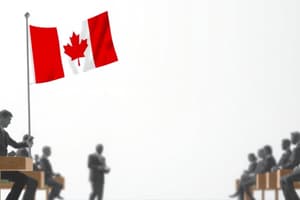Podcast
Questions and Answers
What is the official name of Canada's No-Fly List?
What is the official name of Canada's No-Fly List?
- Secure Air Travel Act List
- Passenger Protect Program (correct)
- Transportation Security Act
- Air Travel Safety List
What kind of offenses can lead to placement on the SATA List?
What kind of offenses can lead to placement on the SATA List?
- Traffic violations
- Terrorism-related activities (correct)
- Fraudulent activities
- Environmental crimes
Which group was explicitly mentioned in the context of historical case studies related to the Charter?
Which group was explicitly mentioned in the context of historical case studies related to the Charter?
- Irish Canadians
- Polish Canadians
- Ukrainian Canadians (correct)
- Scottish Canadians
Which of the following issues is NOT mentioned as impacting the workplace under the Charter?
Which of the following issues is NOT mentioned as impacting the workplace under the Charter?
How do labor unions relate to the Charter?
How do labor unions relate to the Charter?
What is the purpose of the Charter of Rights and Freedoms?
What is the purpose of the Charter of Rights and Freedoms?
Which of the following rights is NOT included in the individual rights outlined in the Charter?
Which of the following rights is NOT included in the individual rights outlined in the Charter?
Which right allows Canadians to move anywhere within the country and earn a living?
Which right allows Canadians to move anywhere within the country and earn a living?
What does the term 'equality rights' refer to in the context of the Charter?
What does the term 'equality rights' refer to in the context of the Charter?
How often must Canadians vote for a new government according to the democratic rights outlined in the Charter?
How often must Canadians vote for a new government according to the democratic rights outlined in the Charter?
What is a fundamental freedom that Canadians are guaranteed under the Charter?
What is a fundamental freedom that Canadians are guaranteed under the Charter?
Which of the following rights ensures that a person cannot be imprisoned without just cause?
Which of the following rights ensures that a person cannot be imprisoned without just cause?
What document establishes the framework of governance in Canada, including the Charter of Rights and Freedoms?
What document establishes the framework of governance in Canada, including the Charter of Rights and Freedoms?
What is the primary purpose of the Charter of Rights and Freedoms in Canada?
What is the primary purpose of the Charter of Rights and Freedoms in Canada?
Which of the following best describes 'legal rights'?
Which of the following best describes 'legal rights'?
How do rights differ from freedoms, according to the content?
How do rights differ from freedoms, according to the content?
What role do individual rights play in society according to the discussed concepts?
What role do individual rights play in society according to the discussed concepts?
Which of the following is an example of a freedom rather than a right?
Which of the following is an example of a freedom rather than a right?
Why might laws restrict people's choices, according to the content?
Why might laws restrict people's choices, according to the content?
What responsibilities accompany the rights of individuals in Canada?
What responsibilities accompany the rights of individuals in Canada?
What does 'suffrage' in the context of Canadian rights signify?
What does 'suffrage' in the context of Canadian rights signify?
Flashcards
Governance
Governance
The rules describing how a government uses its power.
Charter of Rights and Freedoms
Charter of Rights and Freedoms
The legal document that outlines fundamental rights and freedoms for all Canadians.
Rights
Rights
Things that we deserve as human beings, like access to basic necessities.
Legal Rights
Legal Rights
Signup and view all the flashcards
Freedoms
Freedoms
Signup and view all the flashcards
Constitution
Constitution
Signup and view all the flashcards
Democratic Rights
Democratic Rights
Signup and view all the flashcards
Mobility Rights
Mobility Rights
Signup and view all the flashcards
Individual Rights
Individual Rights
Signup and view all the flashcards
Collective Rights
Collective Rights
Signup and view all the flashcards
Fundamental Freedoms
Fundamental Freedoms
Signup and view all the flashcards
Labour Union
Labour Union
Signup and view all the flashcards
Gender Equality
Gender Equality
Signup and view all the flashcards
Equality and Ageism
Equality and Ageism
Signup and view all the flashcards
Canadian Charter of Rights and Freedoms
Canadian Charter of Rights and Freedoms
Signup and view all the flashcards
Secure Air Travel Act List (SATA List)
Secure Air Travel Act List (SATA List)
Signup and view all the flashcards
Study Notes
Canada's Charter of Rights and Freedoms
- The Charter of Rights and Freedoms outlines the rights and freedoms guaranteed to Canadian citizens and permanent residents.
- The Charter, within Canada's Constitution, defines the responsibilities of the government.
- The document details the fundamental rights and freedoms guaranteed to Canadians.
- The Charter covers individual and collective rights and freedoms.
Rights vs. Freedoms
- Rights: Refer to essential human needs and entitlements, like clean water, adequate food, shelter, and healthcare.
- Legal Rights: Specific rights established by law. These rights cannot be denied, and citizens have a legal obligation to respect the rights of others.
- Freedoms: Allow individuals freedom of action - an absence of interference in one's choices. The government is responsible for ensuring legal rights do not unduly restrict freedoms.
Individual Rights in the Charter
- Fundamental Freedoms: Include the freedoms of expression, religion, peaceful assembly, and association.
- Democratic Rights: Grant the right to vote for members of the House of Commons and provincial legislatures, and to vote for new governments.
- Mobility Rights: Allow individuals to reside anywhere in Canada, earn a living, and enter, stay in, or leave Canada.
- Legal Rights: Include freedom from imprisonment, search and seizure without legal justification, and the right to a fair trial. Individuals are presumed innocent until proven guilty.
- Equality Rights: These rights secure freedom from discrimination, regardless of race, national or ethnic origin, religion, gender, age, or mental/physical disability.
Charter and the Workplace
- Labour unions act to safeguard workers' rights and interests.
- Gender Equality and Pay Equity are addressed in the Charter.
- Equality and ageism issues in the workplace are protected under the Charter.
How the Charter Affects Law Making
- Case studies provide examples of how Charter violations lead to legal changes.
- Several case studies (e.g., Communication Barrier, restrictions on flying, banning junk food) are examined illustrating how Charter violations translate into new laws or adjustments.
Historical Case Studies
- First Nations and the Indian Act
- Canadian Women's Right to Vote
- Internment of Ukrainian Canadians
- Internment of Italian Canadians
- Internment of Japanese Canadians
Post-Case Study Reflection Questions
- Identify who benefited and who was negatively impacted by each law.
- Evaluate the impact a law might have on one's quality of life.
- Discuss if a law should have been changed.
- Explore the law's impact on various groups in society.
- Determine which Charter issues each case violated.
- Analyze how the law's passage might affect future situations.
- Assess how the law could lead to greater violations of the Charter.
Vocabulary
- Specific legal terms related to the Charter are included in the provided vocabulary list, such as Charter, Rights, Freedoms, Constitution, Discrimination, Suffrage, War Measures Act, Internment, Gender, Equality Rights, Association, Governance, Imprisonment, etc., plus related historical events from Canada.
Studying That Suits You
Use AI to generate personalized quizzes and flashcards to suit your learning preferences.




